Luke Ford has provided terrific coverage of Tuesday night’s (12.12.06) discussion between N.Y. Times writers Sharon Waxman and Laura Holson and L.A. Times writers Patrick Goldstein and John Horn about who’s got the edge in covering Hollywood — the N.Y. Times, the L.A. Times or industry bloggers? (The chat was titled “L.A. vs. New York: Who’s Got the Scoop on Hollywood?”) Variety film editor Dana Harris moderated.
Ford has provided a sound file (very good listening) but here are some choice quotes (provided by Ford): (a) Goldstein: “The Envelope is about attracting Oscar advertising [and] Oscar prognostication is over-the-top and unhealthy”; (b) Horn: “It’s insipid”; (c) Goldstein: “It is almost impossible to beat the internet at the straightforward news game — we have to add analysis”; (d) Horn: “Putting Calendarlive.com behind a paywall was a disaster…a fiasco.”
Ford says he asked the first question of the night: “What makes you think David Geffen [understood to be a possible buyer of the L.A. Times] is a fan of free inquiry? The guy’s a bully. The guy is a blackmail artist. The guy’s a thug. The guy is a lowlife.”
Goldstein: “He’s a thug? I have a list on my wall of people I think of as thugs and David Geffen wouldn’t come close to being on that list.”
Waxman: “Patrick, come on. David Geffen is the one man…who you ask around town, people are afraid of him. They do not pick fights with him because David Geffen has nothing to do. He has a very long memory. He bears a grudge. He will mount a campaign against someone to get back…”
Month: December 2006
“Dreamgirls” ducats
We all know that anyone looking to see Dreamgirls at one of the platform engagements in New York, Los Angeles, San Francisco, et. al., starting on 12.15 will have to plunk down $25 bucks a pop. And in advance, actually, because advance sales are going pretty well, according to this N.Y. Daily News story by Van Pereira and Nicole Bode. “It’s supposed to be the best film of the year,” says Howard Goldberg, a Hell’s Kitchen businessman. “I would pay $25 dollars for this.”
Adieu, Peter Boyle
Thanks to reader Tommy Matolla for sending along a photo of the just-departed Peter Boyle as campaign manager Marvin Lucas in Michael Ritchie‘s The Candidate (1972) — my all-time favorite Boyle performance. When I heard of his passing this morning I thought immediately of how superbly on-target he was as the guy who managed, manipulated and mind-fucked Bill McKay (Robert Redford) in his California campaign for the U.S. Senate.
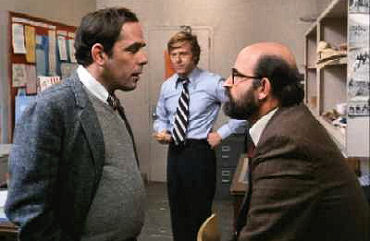
Well-mannered and nicely dressed in a trimmed beard and glasses, Lucas was a sly politico with a cynical heart and a whatever-works attitude, and Boyle’s air of witty refinement surprised a lot of people given his then-current rep as a thuggish meathead type — due, of course, to his breakout performance in John Avildsen‘s Joe (’70), in which he played a hippie-hating blue-collar guy.
And yet Boyle also portrayed Lucas with a subtle (and in my view, quietly hilari- ous) comedic edge. He delivers each line with total sincerity (as far as it goes) but at the same time lets the audience know that Boyle knows that Lucas is a kind of amiable devil — and at the same time just a practical pro with a job to do. It was this performance, I think, that made people realize he was much more than a one-trick blue-collar pony. (Few seemed to understand when it first opened that The Candidate was a very dry comedy — every scene has an oblique comic thrust.)
98% of the public thought of him as the cantankerous Frank Barone in Everybody Loves Raymond, which ran from ’96 to ’05 (while providing Boyle with much financial comfort) but his glory period was from ’70 to ’76: Joe, The Candidate, Steelyard Blues (another hilarious turn), The Friends of Eddie Coyle (as a sinister Boston bartender who handled the hit on Robert Mitchum), Mel Brooks‘ Young Frank- enstein (his legendary performance as a randy, tap-dancing, Wall Street Journal -reading monster with a huge schtufenhaufer) and lastly Martin Scorsese‘s Taxi Driver (in which Boyle played Wizard, the loutish, know-it-all cabbie).

He had a good career after this, but the quality of roles and films for the last 30 years were touch and go. Boyle’s last solid performance in a first-rate feature film was in Marc Forster‘s Monster’s Ball, in which he played Billy Bob Thornton‘s racist father.
In the summer of ’70 or ’71 a guy I used to know ran into Boyle one night at an outdoor bar on the grounds of the Tanglewood Music Festival. After a couple of pleasantries he offered Boyle a freshly-poured brew and said, “Have a Budweiser, king of beers!” — one of the signature lines from Joe. I don’t remember if Boyle accepted it or not, but as he walked off he said to my friend (or so I was told), “Thanks, kid — you’re all right.”
Villaca on Cuaron, “Men”
Alfonso Cuaron‘s Children of Men “has not one or two but three of the most spectacular shots ever conceived by a filmmaker,” writes MCN’s Pablo Villaca. “And the best thing is the film is more than technically marvelous; it tells a touching story full of significance. I fell deeply in love with this movie.
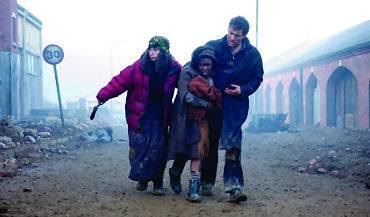
“But it’s also rich enough that it allows its fans to defend it from a more rational, cold and detached point of view as well. And if I’m going to succeed on making a case for why it’s the best film of 2006, that’s how we should proceed.”
Has anyone else besides Pablo Villaca and myself picked Children of Men as their Best Film of the Year? I don’t mind being a party of two — totally cool with that — but I’m curious.
“From a structural standpoint, Children of Men has characteristics of an action movie — a very good one. But what the audience will feel is that they’re watching an essentially dramatic and political narrative, for all the chase is part of very well con- structed plot and always plausible, and it doesn’t merely follows genre formulas.
“Cuaron proves his gifts as a storyteller when he manages to establish the univ- erse in which the story is set even before the title appears on screen. In a gray, chaotic and hostile London, we follow Theo while he barely escapes a terrorist attack — an incident that sets the tone of insecurity and violence that will dominate the whole film.
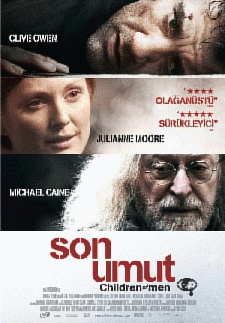
“Building a convincing portrait of the post-apocalyptic world and its social convul- sion, the film’s production design is phenomenal even in its small details, providing the audience with important information through scenic props such as newspaper clippings, photos and protests written with graffiti on city walls (which is how we’re introduced to the concept of an imminent uprising).
“Finally, the idea of showing Michelangelo’s David (rescued from a destroyed Italy) with a prosthetic leg reveals a curious — but appropriate — sense of humor by the filmmakers.”
Holliday bitch ‘n’ moan
Jennifer Holliday, 46, the original “Effie” in the Broadway production of Dreamgirls, is whining to L.A. Times writer Greg Braxton that she isn’t getting enough coattail action off the forthcoming movie version, and that there’s too little respect/acknowledgment from the filmmakers and publicists behind the Dreamamount film. Gee, that’s tough.

There’s a reason that Holliday, 200 pounds lighter than she was during the original play’s run, sounds like only a slightly tamer version of the well-known handful she was 25 years ago. She’s older and presumably wiser, but let’s face it — leopards don’t change their spots.
“She has worked steadily over the years but has never come close to matching her glory days as Effie,” writes Braxton. “Post-Dreamgirls,Holliday’s professional career and personal life could produce enough material for several Broadway shows: A suicide attempt at 30. Bankruptcy. Two failed marriages. Bouts with clinical depression.
“She dropped out of the public eye for years, drawing a startled reaction when she showed up in 1997 — 200 pounds lighter due to gastric bypass surgery — on Ally McBeal in a recurring role as a choir director.
“Although Dreamgirls has not had a major stage production for more than 20 years, Holliday said she had been the only one keeping the torch burning, performing ‘And I Am Telling You I’m Not Going’ at the private parties, corporate dates and engagements at gay nightclubs that have been her key source of income.
“Why is it necessary for them to wipe out my existence in order for them to have their success?” Holliday says of the Dreamamount team. “It’s scary that they can be so cruel. I know it’s business, but why do they have to go to this extreme? I’m a human being. I need to work too. Why do I have to die to make them a winner?”
“Some speculate that the filmmakers fear that comparisons to Holliday may dull the glow surrounding the performance of Jennifer Hudson, the former American Idol contestant who plays Effie in the film. Hudson has been considered an early favorite for an Oscar nomination.
“Wrote New York Post columnist Liz Smith: ‘Life is imitating art now. Jennifer Holliday, who was so incredible onstage in Dreamgirls as the original Effie, has incurred the wrath of Paramount for being uncooperative and not helpful in publicizing the movie. Word came down to omit any photo of her from the publicity for the movie version.’
Holliday “lives in Harlem and admits she is a bit of a recluse — she doesn’t go out much, doesn’t have a cellphone, doesn’t do e-mail,” Braxton relates.
“She is a ferocious reader of newspapers and magazines, loves courtroom shows on TV and watching movies — primarily musicals — until the sun comes up (‘”I am definitely not a morning person’). Holliday handles her own career — no agent, no publicist, no manager.”
These last two graphs say everything. Staying up all night watching movies, not getting up until noon or early afternoon, living on her own planet sans internet access and any sort of professional representation…forget it! She obviously wants to hide away, be excluded….lose.
Kate Moss billboard
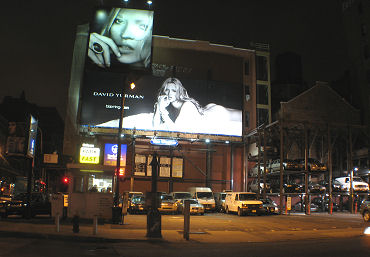
Somewhere between 14th Street and St. Marks Place (does it matter?) — Tuesday, 12,12.06, 9:55 pm. (Good to see that Neck Face is still kicking.)
Lane’s lament
“My saddest moment in a movie theatre came a month ago, when I screened All About Eve to a bunch of acquaintances, one of whom came up to me at the end. ‘What happened?’ she asked.
“‘Well,’ I replied, ‘Anne Baxter got the award, and Bette Davis sat there all steamed up, and George…’
“‘No,’ she said, tapping her foot, ‘what happened to movies like that? Movies with four great parts for women and lines you want to quote? Where did they go?’
“No idea, but they sure as hell aren’t coming back.” — from Anthony Lane‘s dispirited sum-up of 2006 movies, in the 12.18.06 in The New Yorker.
Stone’s Cuban bust
Nikki Finke today passed along a Miami New Times story about Oliver Stone‘s Ixtlan production company and four individuals agreeing to pay $6,322.20 to “resolve allegations of violations of the Cuban embargo” between February 2002 and May 2003, which is when Stone shot Looking For Fidel, his HBO documentary about Cuban dictator Fidel Castro. Finke’s story starts with the word “busted!” A $6322 fine? Whoooo….
Obama for the Bears
Here we go with another Barack Obama thing, but this one‘s really good — trust me. It ran, according to N.Y. Times political blogger Lisa Tozzi, “just before the start of the Monday Night Football matchup between the Chicago Bears and the St. Louis Rams on ESPN.”
S.F. Film Critics Circle honors “Children”
Todd Field‘s Little Children has scored its first Best Picture win of the season from the San Francisco Film Critics Circle, although United 93‘s Paul Greengrass took the Best Director prize. (Definitely a momentum thing happening here, but will Academy members give a hoot? I’d love to see enough of a turnaround by the “too-sooners” to change the odds, but does anyone see this happening?)
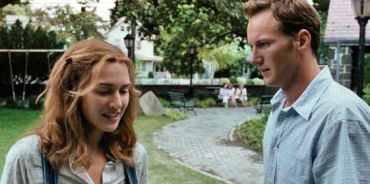
Borat‘s Sacha Baron Cohen was anointed Best Actor, Helen Mirren won the Best Actress prize (again) for her performance in The Queen, Little Children‘s Jackie Earle Haley scored a second Best Supporting Actor win after yesterday’s N.Y. Film Critics Circle win, and Babel’s Adriana Barraza was named Best Supporting Actress. Guillermo del Toro’s Pan’s Labyrinth was named Best Foreign-Language Film, and Davis Guggenheim and Al Gore‘s “An Inconvenient Truth won for Best Documentary.
Sarris’s bathroom break
“The producers of Happy Feet have Andrew Sarris‘ bladder to thank for their movie winning the New York Film Critics Circle’s prize for Best Animated Feature,” says a N.Y. Post “Page Six” item that doesn’t credit Bilge Ebiri’s nerve.com story as the source. “Sarris, of the New York Observer, was in the men’s room during the vote yesterday that gave the prize to the penguin musical, narrowly defeating Richard Linklater‘s A Scanner Darkly. Back from the toilet, Sarris said he meant to pick Scanner, thus making it the winner — but his choice was discounted because the result had already been announced.” What — the NYFCC couldn’t wait five minutes? Odd.
“Shepherd” Party at Time Warner Center
N.Y. Times Oscar columnist David Carr (a.k.a. “the Bagger”) has written a pretty amusing account of last night’s premiere and after-party for The Good Shepherd, including a zero-energy, zero-connection interview with director Robert De Niro.
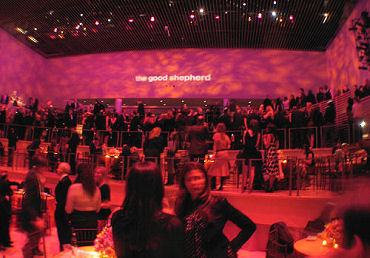
Carr quotes Universal publicist Michael Moses (“a fast-talking…exec with amazingly animated hands”) saying that “this is a real movie…it’s not something you’d see on television. Maybe we should have put a song-and-dance number into it — I hear those are quite popular — but after 9/11, people are very much interested in the C.I.A. We are really, really proud of the movie Bob made.”
I also attended the Good Shepherd premiere and the after-party. The film didn’t play any differently for me the second time — muted, somber and funereal.
I mentioned the last adjective to a very bright director friend, who replied as follows: “I liked it, actually. That said, ‘funereal’, although not the word I would personally choose to describe it, is accurate. It has a funereal atmosphere, almost aggressively so.
“What I liked [about it] is that it doesn’t pander in any way. It almost defies you to like it. You’re sitting there saying ‘what is this shit?…you haven’t made me interested in the story or care about the characters’ and it’s very easy to ‘get out’ [of the movie] if you want to do that…it doesn’t deploy the strategies that almost all movies do to bring you in and engage your sympathies. And I respected that.”
The party was held in a huge, multi-tiered space inside the Time Warner Center with a huge glass-wall view of Columbus Circle and Central Park. The lighting was rose tinted, the food was scrumptious, and I wasn’t able to slip into the ultra- exclusive third-tier section where De Niro, Brad Pitt, Angelina Jolie and all the big New York journalist heavies were hanging so nonchalantly.
I asked my Universal publicist pallies for help in this regard but my ambivalence — I didn’t care that much about gaining entry, but on the other hand I did — resulted in my saying “fuck it” and just enjoying the company of others who shared my situation.
